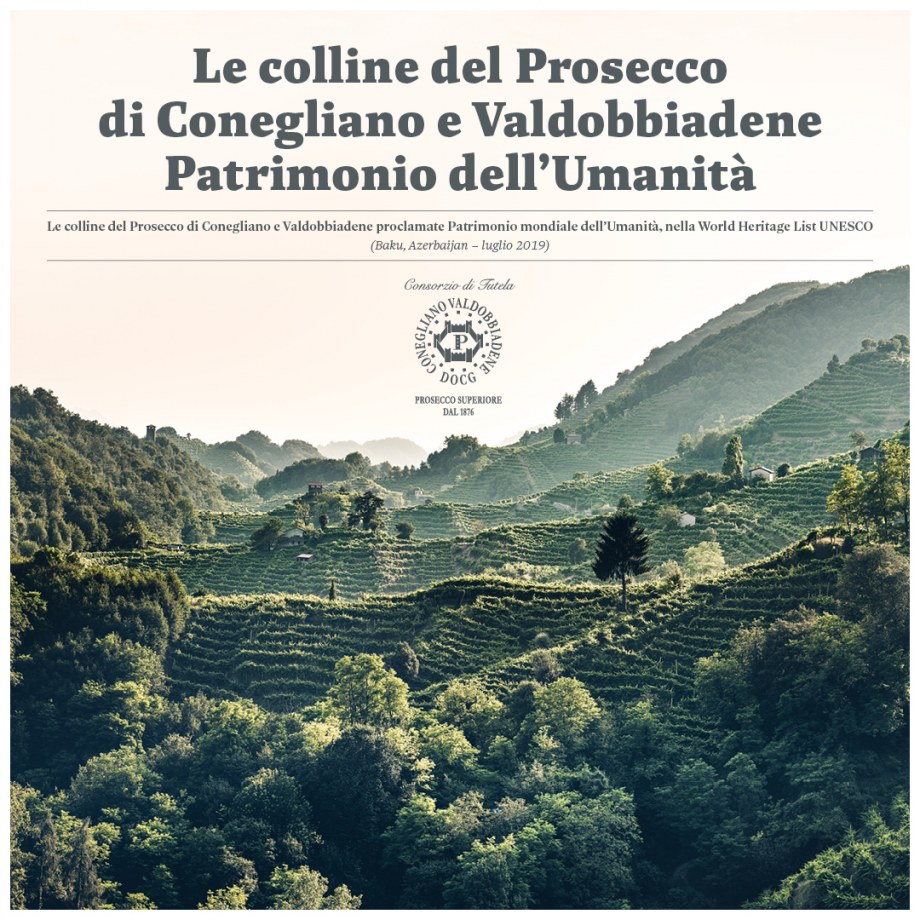A territory that is a global cultural heritage of exceptional universal value, to be protected, preserved, and handed down to future generations.
Innocente Nardi – President of the Temporary Association of Purpose “The Hills of Conegliano and Valdobbiadene World Heritage Site”, and of the Consortium for the Protection of Conegliano Valdobbiadene Prosecco DOCG – expressed his “profound satisfaction and immense joy at the declaration of the Hills of Conegliano and Valdobbiadene as a World Heritage Site”.
“In Baku, the Unesco World Assembly bestowed upon our hills this coveted recognition, thereby making them the 55th Italian site to be protected and safeguarded due to the uniqueness of its cultural landscape. It is thanks to the work carried out by an exceptional team led by the governor of the Veneto Region Luca Zaia, with the contribution of the competent Ministries and impeccable work of the scientific committee – chaired by Mauro Agnoletti -, and not least, the support of the Italian Unesco Delegation, that we have achieved this goal. Speaking of goals – President Nardi added – this recognition should not be seen as a destination, but merely as an important step on a journey towards enhancing the cultural, artistic, and agricultural heritage of this small area, known for its principal product, Conegliano Valdobbiadene Prosecco Superiore”.
The nomination process lasted ten years, and while this journey was both long and at times difficult, not only was it in line with the average times for other registered sites, but it saw the emergence of a solid cohesion amongst the interested parties, from the various municipal administrations and trade associations, to the local entrepreneurs, right down to the area’s inhabitants. It is this enthusiasm and dedication that has enabled us to achieve our objective.
“The producers that make up the Consortium of Conegliano Valdobbiadene Prosecco Docg have been the driving force and soul of the nomination” – added Innocente Nardi. – “Right from the beginning, and throughout the entire nomination process, they have never wavered in their belief in the uniqueness of our landscape, with its vineyard-embroidered hills and inaccessible slopes that require such hard and entirely manual labour. It is the commitment of generations of wine producers working in the vineyards, forging the “patchworks” that we see today, as well as the characteristic “ciglioni”, which distinguish our viticulture – and therefore our territory – from others, that has led to UNESCO recognition“.
As of today, it is the responsibility of us all, but first and foremost that of the Consortium for the Protection of Conegliano Valdobbiadene Prosecco DOCG, in harmony with the newly established site management association, to focus on the conservation and maintenance of the registered landscape assets, while paying particular attention to the Unesco guidelines for their protection and enhancement for future generations, in accordance with the objectives aimed at achieving balanced and harmonious economic and social development.
The objective of such valorisation involves the sustainable development of the registered area, that will be made possible thanks to a management plan drawn up in agreement between the private and public institutions. For years, the theme of sustainability has been present in territorial government plans – thanks to the collaboration of entrepreneurs, wine producers and public administration along with the coordination of the Consortium for the Protection of Conegliano Valdobbiadene Prosecco DOCG- for the protection of the environment and its inhabitants.
Top of the list for the Protection Consortium and the parties involved is the controlled development of tourism in the territory. In fact, particular attention will be paid to this sector precisely because of its decidedly positive economic prospects, despite which these will have to be managed and addressed through a sustainable approach.
The Hills of Conegliano and Valdobbiadene landscape is the 10th site in the world to be registered under the category of “cultural landscape”, and is characterized by three unique attributes, based on different geomorphological and cultural characteristics, compared to the other nine territories (Alto Douro – Portugal, Tokaj – Hungary, Pico Island – Portugal, Lavaux – Switzerland, Langhe Roero and Monferrato – Italy, Champagne – France, Burgundy – France, Saint-Emilion – France, Wachau – Austria). All ten of these sites are evolutionary cultural landscapes, visible results of the interaction – a vital, constantly evolving interaction-, between man and the environment.
“I am extremely proud because Unesco recognition is confirmation of the unique value of the Hills of Conegliano and Valdobbiadene landscape, fruit of man’s work in harmony with nature,” concluded Innocente Nardi.

